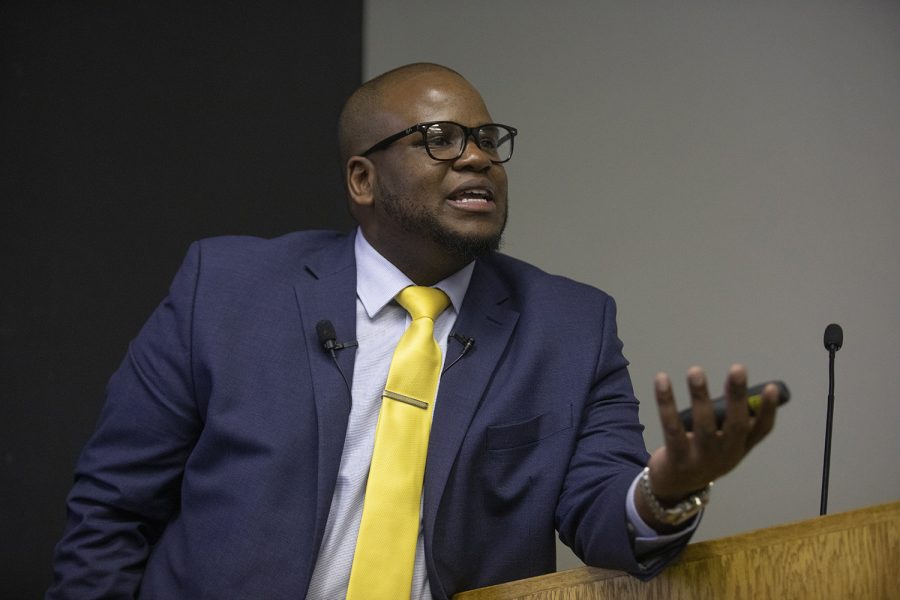UI leaders talk diversity efforts after Wilson’s resignation
Following TaJuan Wilson’s resignation leading diversity, equity, and inclusion efforts at the UI, key UI administrators emphasize maintaining momentum on related initiatives.
TaJuan Wilson speaks during the forum for the associate vice president of diversity, equity, and inclusion on March 25, 2019. He was later selected to fill the role and on Aug. 15, 2019 the UI announced his resignation from the position.
September 30, 2019
The University of Iowa has assigned its recently resigned associate vice president for Diversity, Equity, and Inclusion to research, collect, analyze, and organize information on diversity practices at other institutions and prepare presentations in his temporary role as a special assistant.
TaJuan Wilson, who now works with Vice President for External Relations Pete Matthes on diversity-related projects, has been assigned to review literature of institutions and academic health centers who have implemented such strategies and to summarize his findings. He is also reviewing literature on messaging campaigns aimed at ending sexual misconduct.
In Wilson’s current role, per the terms of his settlement agreement signed in August, he keeps his salary of $224,000. He will leave the UI no later than Jan. 31, 2020 or sooner if he finds a comparable role. He also telecommutes to work and is allowed to job hunt during work hours, though he must be “available for consultation.”
The UI is not immediately starting a search to replace Wilson, who announced his resignation from his post in August after arriving to campus June 28. He filled the position a couple of months after the UI in April released its Diversity, Equity, and Inclusion Action Plan outlining the institutional commitment to strengthening the campus climate for people of all identities.
UI President Bruce Harreld told The Daily Iowan Sept. 23 that he thinks the UI will “eventually” look to fill the role again.
“… If we take another six- to nine-month hiatus to look for a new leader, we lose six to nine months of executing the action plan,” he said. “So let’s get going, let’s get the emphasis right now on the action plan and specifically what we need to do. We will fill that position.”
Search firm Isaacson, Miller on Aug. 30 sent Vice President for Student Life Melissa Shivers — who led the Division of Diversity, Equity, and Inclusion on an interim basis for around a year before Wilson’s arrival — agreeing to conduct another search “for no additional professional fees.”
The UI reported the initial search that led to Wilson’s hire cost $81,999 for search expenses and an additional $21,593.21 to reimburse travel and advertising expenses.
In the meantime, UI Provost Montserrat Fuentes — who arrived to campus the same day as Wilson — oversees the three unit leaders of the Division of Diversity, Equity, and Inclusion.
A DI review of the UI’s peer universities’ organizational charts — which outline the reporting structure of administrators at the institutions — showed that those holding similar roles at seven of the 10 comparable schools report to the president instead of the provost or a vice chancellor.
The UI often turns to peer institutions when pitching its need for more state funding because some of those schools see better outcomes, such as higher graduation and retention rates — which Harreld has said is because those campuses, such as University of North Carolina – Chapel Hill, receive more support per student.
On issues of tuition costs, for example, Harreld has advocated for the UI to compete at or above the median of the peer group.
Asked why in this instance the UI felt comfortable straying from the peer group, Harreld said “context matters.”
“You have to look at specific situations and you have been careful that you don’t go looking at peer groups, and their context is different than yours, then adopt their structure or whatever policy and apply it to your institution,” he said. “That’s not doing your homework and not thinking through the problem very clearly.”
Harreld said many of the UI’s diversity, equity, and inclusion issues pertain to faculty, which he said is in part why that division reports to the provost in absence of a permanent leader.
Fuentes told the DI on Monday that the whole campus needs to take ownership of becoming a more inclusive, diverse, and equitable campus to make the UI a place that all people feel comfortable calling home.
“Those efforts don’t belong just within a particular entity or division,” she said. “… We all need to work on that.”



